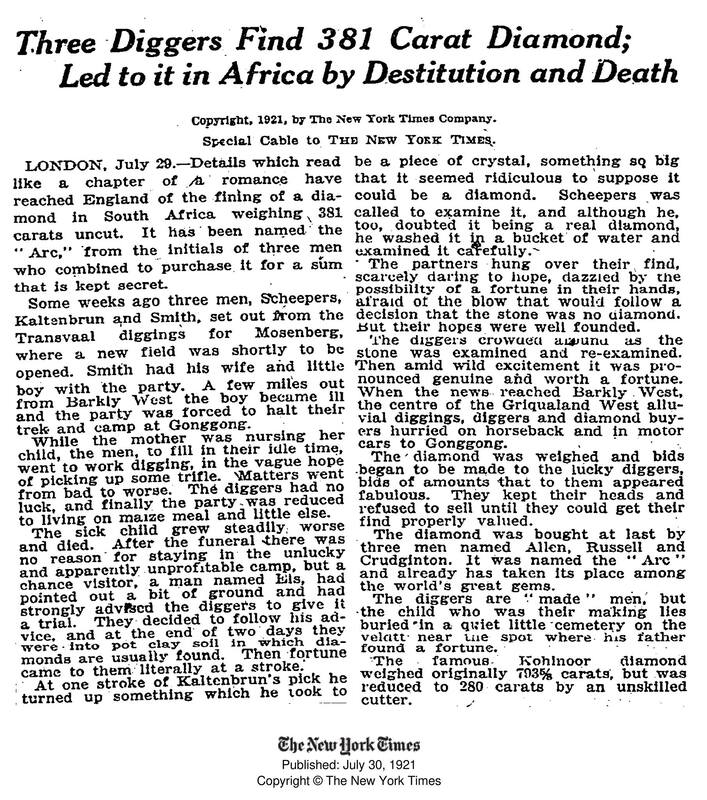Today in Kimberley's History
|
|
|
|
.
381 Carat Diamond found at Gong-Gong, 50km north-west of Kimberley - The New York Times - 29th July 2021
Communist Party of South Africa (CPSA) founded - 1921
The founding conference of the Communist Party of South Africa (CPSA) took place in Cape Town from 30 July to 1 August 1921, however, the party was founded on 29 July 1921 in Cape Town. It was founded mainly by radical White workers and socialists who had experienced workers' struggles in Europe and were inspired by the first workers' state which was founded in 1917 in Russia after the Bolshevik Revolution. The founding conference was preceded by a public meeting in Cape Town attended by over two thousand, mainly coloured, workers. William H (Bill) Andrews addressed this meeting and announced the establishment, aims and character of the new Party. The conference formally established the Communist Party of South Africa (South African Section of the Communist International) and adopted its constitution and manifesto. It also elected an executive with its headquarters in Johannesburg. Andrews was elected secretary-editor, C.B.Tyler, chairman, and S.P. Bunting, treasurer. In 1928 the CPSA and the African National Congress (ANC) began a close working relationship. Although there was much conflict in this relationship due to different working methods and ideas, and the ANC even rejected communism in 1930, it was a lasting relationship as a result of a strong bond built up in exile . In 1953, the CPSA was renamed the South African Communist Party (SACP).
The founding conference of the Communist Party of South Africa (CPSA) took place in Cape Town from 30 July to 1 August 1921, however, the party was founded on 29 July 1921 in Cape Town. It was founded mainly by radical White workers and socialists who had experienced workers' struggles in Europe and were inspired by the first workers' state which was founded in 1917 in Russia after the Bolshevik Revolution. The founding conference was preceded by a public meeting in Cape Town attended by over two thousand, mainly coloured, workers. William H (Bill) Andrews addressed this meeting and announced the establishment, aims and character of the new Party. The conference formally established the Communist Party of South Africa (South African Section of the Communist International) and adopted its constitution and manifesto. It also elected an executive with its headquarters in Johannesburg. Andrews was elected secretary-editor, C.B.Tyler, chairman, and S.P. Bunting, treasurer. In 1928 the CPSA and the African National Congress (ANC) began a close working relationship. Although there was much conflict in this relationship due to different working methods and ideas, and the ANC even rejected communism in 1930, it was a lasting relationship as a result of a strong bond built up in exile . In 1953, the CPSA was renamed the South African Communist Party (SACP).
South African Communist Party(SACP) formally re-launched as a legal organisation - 1990
On 29 July 1990 the South African Communist Party(SACP), which had been unbanned in February 1990, was formally re-launched as a legal organisation at a mass rally in Soweto which was attended by approximately 45 000 people. At the time the SACP faced allegations of conspiring with the African National Congress(ANC) military wing Umkhonto we Sizwe(MK) to use violence to overthrow the government if the negotiations, which were at an advanced stage, failed. During the rally, the SACP named a 22-member interim leadership.Amongst those named wereJoe Slovo, Ronnie Kasrils, the MK chief of staff Chris Hani, the SACP chairman Daniel Tloome, Congress of South African Trade Unions (COSATU)'s assistant general secretary Sydney Mufamadi, COSATU vice-president Chris Dhlamini and the general secretary of the National Union of Metalworkers of South Africa (NUMSA) Moses Mayekiso.The grouping of the membership confirmed the close co-operation between the SACP, ANC and COSATU.
On 29 July 1990 the South African Communist Party(SACP), which had been unbanned in February 1990, was formally re-launched as a legal organisation at a mass rally in Soweto which was attended by approximately 45 000 people. At the time the SACP faced allegations of conspiring with the African National Congress(ANC) military wing Umkhonto we Sizwe(MK) to use violence to overthrow the government if the negotiations, which were at an advanced stage, failed. During the rally, the SACP named a 22-member interim leadership.Amongst those named wereJoe Slovo, Ronnie Kasrils, the MK chief of staff Chris Hani, the SACP chairman Daniel Tloome, Congress of South African Trade Unions (COSATU)'s assistant general secretary Sydney Mufamadi, COSATU vice-president Chris Dhlamini and the general secretary of the National Union of Metalworkers of South Africa (NUMSA) Moses Mayekiso.The grouping of the membership confirmed the close co-operation between the SACP, ANC and COSATU.

